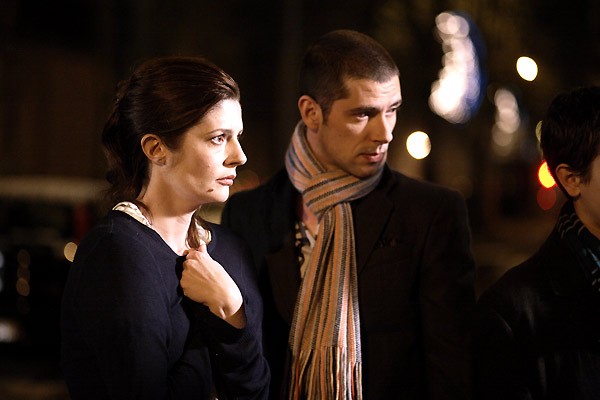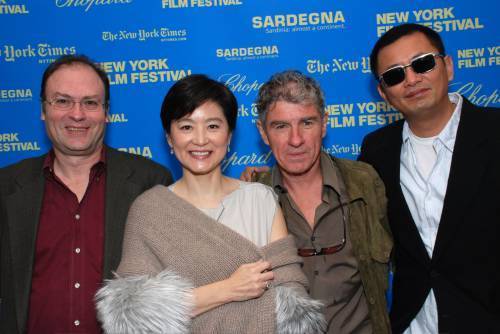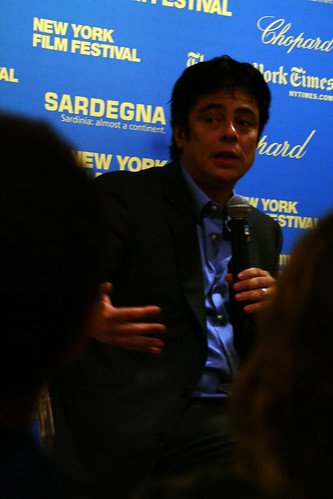-
Arnaud desplechin: A christmas tale (2008)
ARNAUD DESPLECHIN: A CHRISTMAS TALE (2008)

EMILE BERLING, MATTHIEU AMALRIC, CATHERINE DENEUVE
A conventional movie subject that isn't
The Christmas picture with a big family uncomfortably gathered at the parental manse is a cinematic cliché, and Desplechin, using a galaxy of by now increasingly familiar French film actors, can't totally escape that, but being a director who has always liked to work with complex family histories and the dark secrets they conceal, this is both an irresistible mode and one he is well able to treat in fresh ways. The film begins with an ominous twist: Junon Vuillard (Catherine Deneuve) the matriarch, has just been diagnosed with a form of the leukemia that killed her first-born, Joseph. And the doctor says only a marrow transplant can help her, though it could also kill her, and her infection isn't absolutely certain yet. The Christmas gathering has many functions, then--and Desplechin skillfully juggles them all, constantly changing focus and scenes and backing them with a cornucopia of musical pieces from rap to jazz to soul to Wagner. The family members will consider the mathematical probabilities to decide what Junon should do (and this is done with great serousness and accuracy). Tests will narrow down possible family donors. Christmas will be celebrated, with a festive dinner and exchange of presents on the 24th and midnight mass. Old attractions and renunciations will emerge, and old hostilities will be at least temporarily suspended.
When little Joseph was diagnosed, there was only one other child, Elizabeth (Anne Consigny); she's now a tormented playwright, married to a mathematician, Claude (Hippolyte Girardot). Junon and Abel (Jean-Paul Roussilon) had a third child hoping to find a compatible bone marrow donor, but Henri (Matthieu Amalric) could not help, and Joseph died at the age of seven--while the profligate, madcap Henri enraged Elizabeth so much as an adult that six years ago she settled a major debt for him and then ordered him never to cross her path again: she has "banished" him, recalling the fact that Desplechin uses royal metaphors in describing families, having called his last film, also dominated by parental and sibling passions and curses, Kings and Queen. The other, youngest son of Abel and Junon is Ivan (Melvil Poupaud), a once shy and crazy youth who's now a cheerful peacemaker; he's married to the beautiful Sylvia (Chiara Mastroianni). And they have two colorful little boys, Basile and Baptiste (Thomas and Clement Obled). Also close to the family is Simon (Laurent Capelluto), Junon's painter nephew, taken in by Abel and Junon when his own parents died, whose long-concealed secret Sylvia is going to learn. Elizabeth and Claude have a troubled 16-year-old son, Paul (Emile Berling), who's recently been hospitalized for a psychotic episode and is on a galaxy of medications. Ivan was similar at that age but avoided such "prison" and tries to connect with and cncourage Paul.
Again the director has made a movie with Matthieu Amalric (who starred in his first feature) in a central role as a crazy guy, the financially disastrous and heavy-drinking Henri, and wut Emmanuelle Devos as his girlfriend, Faunia, who comes for the Christmas festivities, but partly because she's Jewish, can't sit out the Christian holiday and returns from Roublaix to Paris. Deneuve has a bigger role than she did in Kings and Queen, while Devos, who has been Desplechin's "muse" in some sense since his first feature, has a less central one this time, though she still lights up the screen, and has time to go shopping with Junon, who says she likes her, bu then disappears leaving her at a department store.
In an interview at the New York Film Festival when Desplechin was asked why he liked Devos so much, he said there were too many reasons to list them. And it's the mark of a great and original director, a role that Desplechin aspires to quite often deservedly, that he can keep using the same actors and always give them new things to do. We've seen Amalric as a madcap disaster before, but he's still different this time. We've seen Deneuve as the grande dame before, but never quite like this, and her acting grows richer and more natural with every year (this eternally regal beauty is now 64).
Young Paul and Henri turn out to be the possible marrow donors. Paul is willing, but Elizabeth doesn't want him to be involved in the dangerous and painful experience--and Henri volunteers, forcing Elizabeth to accept him for the nonce. The understanding has been all along that in these emergency circumstances everyone is coming together at the house in Roublaix, but this makes it mandatory.
Events will still include some wildly provocative behavior by Henri. Abel (who calls himself "an old toad") provides a comforting presence, and Junon a serene, regal one. She admits to being afraid at one point (the film includes realistic, but never gruesome, scenes in the hospital) but brings no tragedy or melodrama to her role. In fact as both Deneuve and Desplechin agreed at the New York Film Festival interview, the dialogue is so specific that "acting" in the sense of emotional underlining isn't much needed and performers were advised to play against the hilarity or the sadness of their respective moments. The effect of this toning-down is to avoid the pretension some of the director's earlier films have fallen into, with no loss of complexity. Though this is a glorious feast for fans it's also true as the 'Variety' reviewer Derek Elley says that like all Desplechin's oeuvre this is still primarily for "hardcore addicts of the helmer and gabby French cinema." (Include me in.) The action takes us through the transplant, but not any results. The whole pleasure of the film is in its scene-to-scene texture, the fun of the cinematic style (old-fashioned inter-titles help clarify the family structure, and iris fade-ins and fade-outs help keep things jaunty), and the sense of a world too elaborate not to be real--and yet, for devotees, also clearly a vision burst full blown from the head of M. Desplechin. In the end, despite the "Christmas tale" format, there's ultimately not much you could really call cliché here.
US release of A Christmas Tale (Un conte de Noël) by IFC Films is scheduled (NYC) for November 14, 2008.

CHIARA MASTROIANNI, MELVIL POUPAUD IN UN CONTE DE NOEL
Last edited by Chris Knipp; 04-03-2023 at 08:52 PM.
-

HOBERMAN, DOYLE, LIN, WONG KAR-WAI i

BENICIO DEL TORO (OF SODERBERGH'S "CHE")
Last edited by Chris Knipp; 08-09-2014 at 01:25 PM.
-
Last edited by Chris Knipp; 12-30-2009 at 12:25 AM.
 Posting Permissions
Posting Permissions
- You may not post new threads
- You may not post replies
- You may not post attachments
- You may not edit your posts
-
Forum Rules






 Reply With Quote
Reply With Quote


Bookmarks